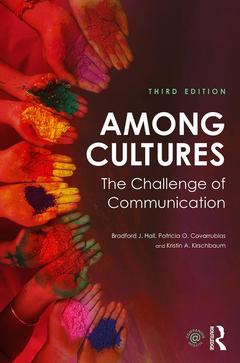Among Cultures (3rd Ed.) The Challenge of Communication
Auteurs : Covarrubias Patricia O., Kirschbaum Kristin A., Hall Bradford 'J'

Among Cultures: The Challenge of Communication, Third Edition explores intercultural communication and the relationship between communication and culture, using narrative as a common and compelling thread for studying intercultural interactions. Anchored in the position that people make sense of their worlds through choosing and telling narratives to themselves and others, this text is replete with narratives and stories. Chapters address key aspects of intercultural communication, including verbal and nonverbal communication; stereotypes and bias; identity; conflict; diversity; and ethics. Using an interpretive approach to intercultural communication, the text helps students understand that although a person may appear different, his/her common sense is quite reasonable within a particular interpretive context. Resources are included to help students understand and explain the reasonableness of other cultural systems.
The text includes activities for students to complete while reading, including self-assessments and nonverbal self-knowledge tests. Reflection questions within and at the end of each chapter promote thinking and discussion on each topic. With its unique approach to studying intercultural communication via real-life narratives, this text facilitates a deep understanding of the cultural aspects of communication. In providing the narratives of others, it encourages students to tell their own stories and build a strong foundation for communicating across cultures.
New to the Third Edition:
- New chapter?"What Role Does Culture Play in Contemporary Contexts?"?explores intercultural communication as it relates to the environment, health, and technology.
- New sections on identity, silence, and terms of address as important communicative practices in intercultural settings.
- Updated sections on honorifics, key terms, social dramas and the golden approaches to ethics.
1. What is Meant by Intercultural Communication?
- Culture
- Communication
- Intercultural Communication
- Intercultural Communication as a Field of Study
- Hazards of Studying Intercultural Communication
- Benefits of Studying Intercultural Communication
- Summary, Reflection Questions & Activities
2. What is the Relationship between Communication and Culture?
- Manifestations of Culture
- World Views
- Values
- Norms
- Two Perspectives on the Culture Communication Connection
- Summary, Reflection Questions & Activities
3. How Can We Learn About Our Own and Others' Cultures?
- The Learning Process
- The Etic/Emic Distinction
- Hymes SPEAKING Framework: An Etic Grid
- Narratives
- Key Terms
- Ritual
- Social Dramas
- Summary, Reflection Questions & Activities
4. How is Culture Related to Our Identities?
- Identity
- Personal, Relational and Communal Levels of Identity
- Communication's Relationship to Identity
- Pathways to Identity
- Avowal
- Ascription
- Summary, Reflection Questions & Activities
5. Where Can We Look to Explain Verbal Misunderstandings?
- Overview
- Verbal Communication and Context
- Verbal Communication: Structure And Content
- Terms of Address
- Silence
- Face Considerations
- Language and Thought
- Summary, Reflection Questions & Activities
6. Where Can We Look to Explain Nonverbal Misunderstandings?
- Roles of Nonverbal Communication
- Forms of Nonverbal Communication
- Kinesics
- Proxemics
- Paralanguage
- Other Forms of Nonverbal Communication
- Intercultural Listening and Nonverbal Communication
- Summary, Reflection Questions & Activities
7. Why Do So Many People Get Treated Poorly?
- Stereotyping
- Ethnocentrism
- Prejudice
- Summary, Reflection Questions & Activities
8. How Can We Manage Conflict in Intercultural Settings?
- Cultural Approaches to Conflict
- Types of Intercultural Conflict
- Intergroup Conflict
- Strategies for Managing Intercultural and Intergroup Conflict
- Recognizing Reasonableness
- One Final Point to Ponder: Forgiveness
- Summary, Reflection Questions & Activities
9. How Can We Succeed in Our Intercultural Travels?
- Hierarchy of Human Needs
- Acculturation: Four models
- Returning Home: Readapting to Our Own Cultural Community
- Final Thoughts on Cultural Transactions
- Summary, Reflection Questions & Activities
10. What Diversity Exists in the Study of Intercultural Communication?
- Major Perspectives in Intercultural Communication
- Interpretive Perspective
- Critical Perspective
- Social Scientific Perspective
- Popular Culture
- Critical Perspectives of Popular Culture and the Media
- Social Scientific Perspectives of Popular Culture and the Media
- Summary, Reflection Questions & Activities
11. Can Judgments of Right and Wrong be Made when Dealing with Other Cultures?
- Ethics & Six Golden Approaches
- Ethics and Communication
- Ethics and Culture
- Universal Ethics and Relativistic Ethics
- Ethical Principles for Intercultural Relations
- Summary, Reflection Questions & Activities
12. What Role Does Culture Play in Contemporary Contexts?
- Environmental Communication
- Health Communication
- Technology and Communication
- Summary, Reflection Questions & Activities
Bradford J. Hall is Head of the Department of Languages, Philosophy, and Communication Studies at Utah State University. He teaches in the areas of intercultural communication and communication theory, focusing on the link between our talk, thoughts, and actions. His research deals with issues of culture, identity, membership, conflict, and everyday conversation.
Patricia O. Covarrubias is Associate Professor in the Department of Communication and Journalism at the University of New Mexico where she teaches cultural and intercultural communication, cultural discourse analysis, global metaphors, qualitative research methods, and the ethnography of communication. Her research has been dedicated to understanding the linkages among culture, communication, and peoples’ unique ways of life.
Kristin A. Kirschbaum is Associate Professor at East Carolina University, and has taught courses in health communication, intercultural communication, organizational health communication, interpersonal communication, and communication theory. Her research includes measures of communication in physician populations with structured research protocols aimed to increase collaboration and medical communication among physicians.
Date de parution : 09-2017
15.6x23.4 cm
Disponible chez l'éditeur (délai d'approvisionnement : 14 jours).
Prix indicatif 80,97 €
Ajouter au panierDate de parution : 09-2017
15.6x23.4 cm
Disponible chez l'éditeur (délai d'approvisionnement : 14 jours).
Prix indicatif 184,47 €
Ajouter au panier


